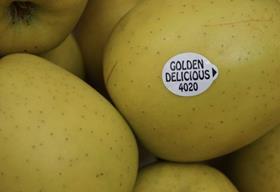
European apple production is set to fall sharply in 2017/18 as a result of the frosts that swept through the continent in April and the spring and early summer droughts.
Figures from the top 21 member states released by the World Apple and Pear Association at today’s Prognosfruit conference in Lleida, Spain point to a total EU apple crop of 9.343m tonnes, a 21 per cent decrease on last year a 23 per cent fall on the three-year average.
The pear crop is forecast to remain relatively stable at 2.148m tonnes, a 1 per cent fall on last season.
By varieties, Golden Delicious is down by 18 per cent to 1.982m tonnes, while Galas are estimated to be down 3 per cent to 1.276m tonnes. Idared and Red Delicious are down 30 per cent and 9 per cent at 679,000 tonnes and 576,000 tonnes respectively.
Production of club varieties is forecast to decrease by 15 per cent from 157,000 tonnes to 133,000 tonnes.
With significantly shorter crops expected in other Northern Hemisphere producing countries, EU growers are reportedly cautiously optimistic about the prospects for the new season. Russia is forecasting a 30 per cent decrease, while production is also down in Mexico (-30 per cent), Switzerland (-21 per cent), Belarus (-19 per cent), Ukraine (-10 per cent) and Canada (-5 per cent).
The US is expecting a stable crop of around 4.8m tonnes, while China anticipates a 3 per cent increase in production to 43.8m tonnes.
In recent years the EU market has faced a glut of apples due to the Russian veto and lower exports to North African markets. It is hoped the new crop could therefore lead to a better balance between supply and demand.
The market will start clearing stocks for most varieties and there is expected to be a good handover from Southern Hemisphere to Northern Hemisphere supply. Overall the new season is due to start two weeks earlier than normal.
“There might be different market trends for each of the varieties, with better balance for Gala and more reduced volume for Golden or Jonagold, and Elstar,” WAPA said in a press release.
Over the coming weeks growers will be keeping a close eye on the quality of the new crop, which could affect the volume of fruit destined for the fresh market.
Current estimates point to 6.2m tonnes of apples being destined for the fresh market and 3.2m tonnes for processing.



